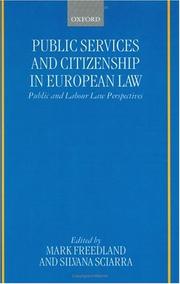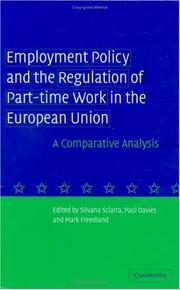| Listing 1 - 5 of 5 |
Sort by
|
Book
ISBN: 9781316091104 9781107086067 9781107450530 1316091104 1108633072 1108579094 110708606X 1107450535 Year: 2018 Publisher: Cambridge Cambridge University Press
Abstract | Keywords | Export | Availability | Bookmark
 Loading...
Loading...Choose an application
- Reference Manager
- EndNote
- RefWorks (Direct export to RefWorks)
The ongoing austerity crisis is being felt in all sectors of EU law, but has had a particularly severe impact on labour law. Silvana Sciarra, a leading judge and scholar of EU employment law, considers how solidarity regimes have been shaken by the crisis. She brings together existing European policies in social and employment law, to enhance synergies and developments in a post-crisis discourse. She looks at reactions of national constitutional courts to austerity measures and of international organizations in re-establishing respect of fundamental workers' rights. Criticizing soft law approaches in employment policies, she favours recourse to binding measures connected with selective financial incentives through European funds. She highlights developments in European sector social dialogue and new horizons of transnational collective bargaining in large multinationals. Taking a positive, practical approach, Sciarra shows how social policies can enhance solidarity and social cohesion, through European financial support.
Social legislation --- Droit social --- Labor laws and legislation --- Travail --- Collective bargaining --- Négociations collectives --- Droit --- Social law. Labour law --- Europe --- Bargaining --- Labor negotiations --- Industrial relations --- Negotiation in business
Book
ISBN: 1472562283 1280800801 9786610800803 1847311911 Year: 2001 Publisher: Oxford [England] ; Portland, Ore. : Hart Publishing,
Abstract | Keywords | Export | Availability | Bookmark
 Loading...
Loading...Choose an application
- Reference Manager
- EndNote
- RefWorks (Direct export to RefWorks)
"The research underpinning this book was designed to support and further develop ideas already described in broader and more theoretical studies,about the dialogues happening among national courts and the ECJ as a key factor of European integration. The role played by the courts as part of the interplay of institutions within the European Union has been recognised as crucial, and this research, which was conducted at the European University Institute, homes in upon some specific examples. It deals with six Member States of the European Union: Denmark, France, Germany, Italy, Spain and the UK, analysing two select but significant areas of substantive law: transfer of undertakings and equality legislation. The analysis dwells on these key areas, although some other fields of social law were selected in order to prove the main theory underlying the whole research. While on the one hand offering a comparative assessment of developments in the six member states chosen for study, the research also highlights national peculiarities as well as the factors perceived to be driving national actors towards the preliminary ruling procedures. This work will be of interest to all scholars of EU law and labour law."--Bloomsbury Publishing.

ISBN: 0198265751 9780198265757 Year: 1998 Publisher: Oxford Clarendon
Abstract | Keywords | Export | Availability | Bookmark
 Loading...
Loading...Choose an application
- Reference Manager
- EndNote
- RefWorks (Direct export to RefWorks)
Public law. Constitutional law --- European law --- Social law. Labour law --- Civil service --- Citizenship --- -Civil service --- -Bureaucrats --- Career government service --- Civil servants --- Government employees --- Government service --- Public employees --- Public service (Civil service) --- Public administration --- Public officers --- Public service employment --- Birthright citizenship --- Citizenship (International law) --- National citizenship --- Nationality (Citizenship) --- Political science --- Public law --- Allegiance --- Civics --- Domicile --- Political rights --- Law and legislation --- Legal status, laws, etc. --- -Citizenship --- European Union countries --- Bureaucrats --- Civil service - European Union countries --- Citizenship - European Union countries

ISBN: 0521840023 0521272874 0511214022 0511215819 0511314868 0511495048 1280540710 0511210442 0511212216 1107151198 9780511210440 9780521840026 9780511215810 9780511212215 9780511214028 9780511495045 9781280540714 9786610540716 6610540713 9780521272872 Year: 2004 Publisher: Cambridge Cambridge University Press
Abstract | Keywords | Export | Availability | Bookmark
 Loading...
Loading...Choose an application
- Reference Manager
- EndNote
- RefWorks (Direct export to RefWorks)
This book originates from the research project 'New discourses in labour law' held at the European University Institute. A detailed analysis of part-time work regulation is presented for seven European countries, in order to ascertain how internal domestic choices of the legislatures have merged into the 'Open method of co-ordination'. The impact of European employment policies is considered in parallel with the implementation of the Directive on part-time work, thus providing a complete overview of both soft and hard law mechanisms available to national policy-makers. In this 2004 work, the interaction between law and policy emerges as a dynamic and constantly changing process of exchange between national and supranational actors, through the use of concrete examples of lawmaking. Labour law is put forward as being central in the current evolution of European law, and this centrality is presented as a confirmation of innovation and continuity in regulatory techniques.
Social law. Labour law --- European Union --- Part-time employment --- Labor policy --- Emploi à temps partiel --- Travail --- Law and legislation --- Politique gouvernementale --- Droit --- Law --- General and Others --- -Labor policy --- -Part-time employment --- -331.25727094 --- Oa1.g --- Alternative work schedules --- Employment, Part-time --- Part-time work --- Flexible work arrangements --- Labor --- State and labor --- Economic policy --- -Government policy --- Emploi à temps partiel --- Part-time employment - European Union countries --- Labor policy - European Union countries --- Part-time employment - Law and legislation - European Union countries --- REGLEMENTATION DU TRAVAIL --- TEMPS DE TRAVAIL --- TRAVAIL A TEMPS PARTIEL --- UNION EUROPEENNE --- DUREE DU TRAVAIL --- DROIT COMPARE --- ETATS MEMBRES --- xxx
Book
ISBN: 9068317849 Year: 1996 Publisher: Leuven Peeters
Abstract | Keywords | Export | Availability | Bookmark
 Loading...
Loading...Choose an application
- Reference Manager
- EndNote
- RefWorks (Direct export to RefWorks)
Social security law --- European Union --- Academic collection
| Listing 1 - 5 of 5 |
Sort by
|

 Search
Search Feedback
Feedback About UniCat
About UniCat  Help
Help News
News